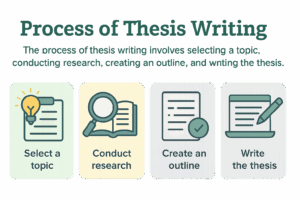Still have questions? Leave a comment

Checklist: Dissertation Proposal
Enter your email id to get the downloadable right in your inbox!
[contact-form-7 id="12425" title="Checklist: Dissertation Proposal"]
Examples: Edited Papers
Enter your email id to get the downloadable right in your inbox!
[contact-form-7 id="12426" title="Examples: Edited Papers"]Need
Editing and
Proofreading Services?

What Is a Thesis: How to Write a Thesis with Examples
 Aug 28, 2025
Aug 28, 2025 6
min read
6
min read
You will likely be required to write many compelling theses in your college years. A thesis is an essential part of your academic endeavors in your college years. It enables you to present your thoughts, opinions, and arguments and helps you get the grades you want. But what exactly is a thesis, and how do you write one effectively?
We will answer these questions in this article. Read on and let us know in the comments below if this guide will prove useful when you write your college thesis this academic year.
Get your thesis edited by experts. Explore our services. Learn more
What is a thesis?
A thesis is a comprehensive statement that presents the main argument or claim of an academic paper, research project, or dissertation. It typically defines the purpose of the work, where readers learn about the researcher or writer’s reasoning.
Research writers present their logic, explain their point of view based on evidence, and draw relevant conclusions accordingly. In academic writing, a thesis is essential because it provides a clear direction and focus for the entire document.
Types of thesis
There are various types of theses depending on the academic discipline or level of study. In undergraduate and graduate programs, you may encounter analytical, expository, and argumentative theses, each serving different purposes.
For advanced research projects, doctoral and master’s theses are commonly required. They focus on original research and contribute new knowledge to the field.
-
Argumentative Thesis
This type of thesis takes a stand on a controversial issue and presents an argument that you will need to defend throughout your essay. For example:
“Government surveillance programs are necessary for national security, but they must be balanced with individual privacy rights.”
-
Analytical Thesis
An analytical thesis breaks down an idea or issue into its components, evaluating and analyzing each part. For example:
“The portrayal of women in 20th-century literature reflects the changing roles of women in society.”
-
Explanatory (Expository) Thesis
This type of thesis simply explains a topic to the reader. It does not take a stand or argue a point. For example:
“The process of photosynthesis is essential for plant life and involves several stages, including light absorption and the production of oxygen.”
How to write a thesis
Writing a thesis is a critical skill for any academic or research-oriented work. It involves distilling the essence of your research or argument into a single, clear statement that will guide the rest of your work.

Here are the essential steps to writing an effective thesis:
1. Understand your topic
Before you can create a good thesis statement, you need to understand your topic well. So, when a topic is assigned, make sure you understand the requirements.
If you are asked to choose a topic, choose one that interests you and is broad enough to allow for extensive research but focused enough to enable a clear evaluation.
2. Craft a preliminary thesis
Once you have a topic in mind, draft a preliminary thesis. Start with a working statement that outlines your perspective, opinion, or argument. This initial thesis does not need to be perfect—it is only a starting point.
Tips for writing a preliminary thesis:
- Make a claim that can be debated. For example, instead of stating a fact, express an opinion that can be argued.
- Keep it concise but informative—aim for clarity without over-explaining.
- Be open to revising your thesis and incorporating or deleting ideas as you continue researching and writing.
3. Make your thesis specific
A strong thesis must be clear, specific, and arguable. It is not enough to simply state your opinion; you need to back it up with a well-reasoned argument that is relevant and specific to your essay topic or the title of your academic paper.
How to refine your thesis:
- Focus on a specific aspect. Define the scope to cover only relevant points.
- Be clear and concise. Avoid vague language that confuses the readers or bores them.
- Ensure all your points are arguable. A good thesis statement should not be a statement of fact. It should present a position that requires evidence and reasoning to support it.
What is a thesis statement?
Developing a relevant thesis statement is essential to writing a good thesis. Let us study the meaning of a thesis statement in this section.
A thesis statement is a summary of the main point or claim of your essay or research paper. Typically, it appears at the end of the introduction and consists of one or two sentences. Its purpose is to inform the reader of the paper’s central argument.
A thesis statement, when written well, sets the stage for the discussion that follows in the essay or academic paper. If you are unsure about how to begin, understanding how to write a thesis statement is a critical first step. So, let’s see how to do that.
Thesis statement examples
Understanding the difference between a weak and a strong thesis is essential for developing your own. Before we study some examples, let us understand what makes a strong thesis.
A strong thesis is clear and specific and presents an arguable and assertive claim. It does not merely state a fact but expresses a position that requires evidence and analysis. It also outlines the key points that will be discussed in the essay or paper. A weak thesis, on the other hand, is vague, unnecessarily comprehensive, or lacks viable arguments. It takes a reader’s focus away.
Here are some thesis examples:
- Weak thesis:
“Social media is a popular way to communicate.”
Why it is weak: It is a fact, not an argument.
- Strong thesis:
“Social media has transformed modern communication, creating both opportunities for global connections and challenges related to privacy.”
Why it is strong: It presents a specific point of view that can be supported with evidence and invites debate.
Popular AI tools like ChatGPT or thesis-specific generators are great for getting started. However, tailor the output to fit the specifics of your assignment to ensure your paper gets a good grade. You can find a list of 2025’s popular thesis statement generators here.
Why is writing a thesis important?
Writing a thesis is a key aspect of academic development in your college years. As a student, it encourages you to engage in deep, critical thinking. Crafting a thesis requires you to analyze complex topics, formulate well-reasoned arguments, and present evidence-backed conclusions convincingly. Hence, it strengthens your research and analytical skills. Also, your ability to communicate ideas clearly and persuasively improves.
A well-written thesis demonstrates mastery over the subject matter and contributes new insights or solutions to a field of study. Additionally, it serves as a benchmark for academic success, showcasing your ability to conduct independent research and engage with scholarly discourse.
Most important of all, writing a thesis is an essential academic milestone that prompts intellectual growth and contributes to the body of knowledge in a given field.
Thesis writing tips and examples
To write a good thesis, you need a strong thesis statement. A good thesis statement makes for effective academic writing. Here are some concise tips to guide you:
1. Start with a question: Identify a research question to focus your thesis.
Example:
Question: How does remote work affect productivity in the tech industry?
Thesis: Remote work has improved productivity by allowing flexible hours, reducing commute times, and increasing job satisfaction.
2. Keep it specific: Ensure your thesis is narrow enough to explore thoroughly.
Example:
Focused thesis: Climate change is leading to more frequent flooding in coastal areas, threatening environments and human settlements.
3. Make it arguable: Present a claim that invites discussion and requires evidence.
Example:
Arguable thesis: Excessive use of social media among students leads to decreased academic performance due to distractions.
4. Revise as needed: Continuously refine your thesis to align with your evolving research and insights.
5. Support with evidence: Back your thesis with reliable data and examples throughout your paper.
By applying these tips, you’ll create a clear and compelling thesis that provides a solid foundation for your academic work.
AI thesis generators: Can they help?
AI thesis generators have gained popularity as tools that assist students and researchers in formulating thesis statements quickly. These tools work by analyzing the topic, keywords, and prompts provided, generating potential thesis statements based on patterns and language models.
While AI thesis generators can offer useful starting points, they are not foolproof. They help streamline the brainstorming process by suggesting concise and coherent ideas, but users should critically evaluate the generated thesis.
The thesis may need refining to ensure specificity, relevance, and arguability. Overall, AI thesis generators can be helpful for inspiration but should not replace thoughtful analysis and critical thinking in academic writing.
Writing an effective thesis will get you the grades you desire. A strong thesis keeps your essay on track and boosts its engagement quotient. Use this guide to write analytical, argumentative, or explanatory papers and master the art of crafting a solid thesis. With practice, you will be able to create compelling, well-structured theses.
If you need a professional review, get in touch with PaperTrue. Our editors can edit your thesis statements and make sure your essays and academic papers convey the right message and get you top grades every academic year.
Here are some articles you might want to check out:




